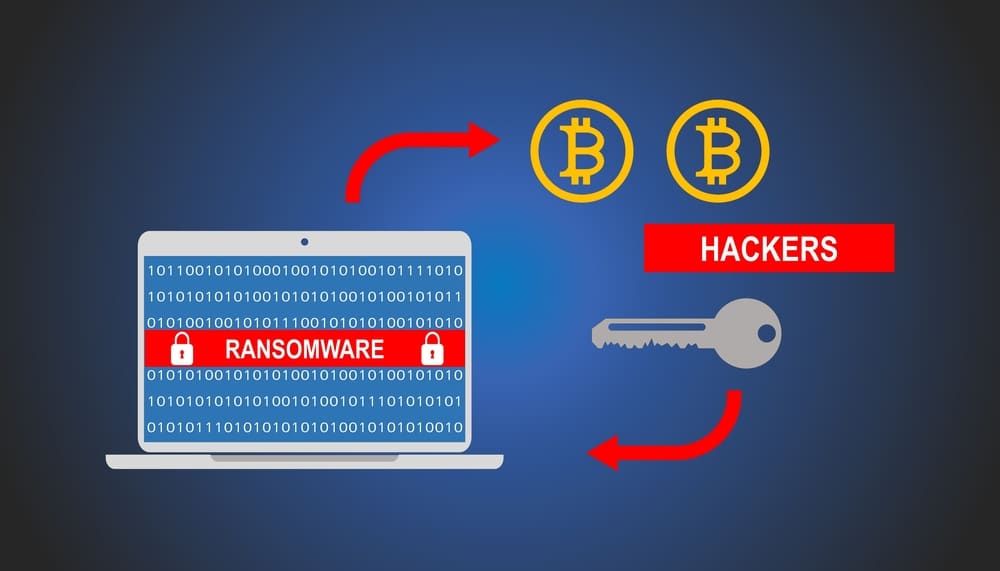A surge in Bitcoin ransomware attacks is posing an unprecedented threat to the U.S. healthcare system, according to warnings issued by the FBI and the Department of Homeland Security (DHS). These attacks, driven by the Ryuk ransomware, are targeting hospitals, crippling operations, and putting patient safety at risk.
The cyberattacks have escalated in both frequency and severity, with six healthcare facilities in New York, Oregon, and California hit in a single day. Authorities are sounding the alarm as hundreds of institutions nationwide remain vulnerable.
Ransomware Attacks Crippling Healthcare Operations
What Is a Ransomware Attack?
A ransomware attack involves malicious software that encrypts a victim’s data, rendering it inaccessible. Hackers then demand a ransom—usually paid in Bitcoin—to decrypt the files. The use of Bitcoin allows attackers to maintain anonymity, making it a preferred method of payment.
Ryuk Ransomware: A Growing Threat
- Origin: Ryuk ransomware, active since 2018, is one of the most notorious strains, responsible for a significant share of global ransomware attacks.
- Target: Initially used to attack businesses and municipalities, Ryuk is now focused on healthcare institutions, taking advantage of their critical dependence on digital records and systems.
- Impact: Since its inception, Ryuk has extorted approximately $61 million in Bitcoin, according to the FBI.
Recent Attacks
- Sky Lakes Medical Center, Oregon: A cyberattack on Oct. 27 disrupted operations, forcing the delay of surgeries.
- St. Lawrence Health System, New York: Two hospitals faced similar attacks, resulting in ambulance diversions during emergencies.
- California: Institutions experienced severe disruptions, raising concerns about patient safety.
Scale and Coordination of the Attacks
Nationwide Coordination
Cybersecurity experts describe the recent attacks as a coordinated assault on the nation’s healthcare system. This scale of targeting hospitals simultaneously across multiple states is unprecedented, underscoring the attackers’ sophistication.
Motivated by Financial Gain
The primary motive behind these attacks is financial gain. By exploiting vulnerabilities in hospital systems, attackers demand ransoms that institutions may feel compelled to pay to restore operations quickly.
Wizard Spider: The Group Behind the Attacks
- Identity: The Ryuk ransomware attacks have been linked to a cybercrime group known as Wizard Spider.
- Reputation: Described as “brazen and heartless,” Wizard Spider is notorious for targeting critical infrastructure and exploiting organizations during crises.
Why Hospitals Are Targeted
Dependence on Digital Systems
Hospitals rely heavily on electronic health records (EHR) and connected medical devices. Any disruption can:
- Delay critical surgeries and treatments.
- Force redirection of emergency services.
- Jeopardize patient care and safety.
Limited Cybersecurity Resources
Many healthcare institutions, especially smaller hospitals, lack robust cybersecurity measures, making them easy targets for sophisticated ransomware attacks.
Pressure to Pay Ransoms
The critical nature of healthcare services often compels hospitals to pay ransoms to restore operations quickly. This perceived willingness to pay makes them attractive targets for cybercriminals.
Impact of Bitcoin in Ransomware Attacks
Why Bitcoin Is Preferred
- Anonymity: Bitcoin transactions are pseudonymous, allowing attackers to receive payments without revealing their identity.
- Global Acceptance: Bitcoin is widely accepted across borders, making it a convenient payment method for cybercriminals.
- Immutability: Once a Bitcoin transaction is made, it cannot be reversed, ensuring attackers receive their funds securely.
Bitcoin’s Role in Cybercrime
Ransomware groups like Wizard Spider have weaponized Bitcoin to extract millions in ransoms. Despite law enforcement efforts to track transactions, the decentralized nature of Bitcoin poses challenges in apprehending perpetrators.
Government Response
FBI and DHS Warnings
The FBI and DHS have issued urgent alerts to healthcare institutions, advising them to:
- Strengthen cybersecurity defenses.
- Regularly back up critical data.
- Educate staff about phishing schemes, a common entry point for ransomware.
Cybersecurity Guidelines
- Update Systems: Ensure all software and operating systems are up to date to patch vulnerabilities.
- Implement Multi-Factor Authentication (MFA): Adds an extra layer of security to login processes.
- Segregate Networks: Isolate sensitive data from internet-facing systems.
Support From Cybersecurity Firms
Private cybersecurity companies are collaborating with federal agencies to mitigate threats and provide emergency response services to affected hospitals.
The Human Cost of Ransomware Attacks
Patient Safety
- Delayed surgeries and diverted emergency services directly impact patient outcomes.
- Prolonged disruptions can lead to life-threatening situations for critically ill patients.
Financial Strain on Hospitals
- Paying ransoms often diverts funds from critical healthcare services.
- The cost of restoring systems and implementing stronger defenses adds to the financial burden.
Emotional Toll on Healthcare Workers
Frontline workers already grappling with the challenges of a pandemic face additional stress due to ransomware-induced disruptions.
Long-Term Implications and Solutions
Raising Awareness
Public and private sectors must collaborate to raise awareness about the risks and consequences of ransomware attacks.
Investing in Cybersecurity
- Allocate more resources to protect critical infrastructure like hospitals.
- Encourage the adoption of advanced security technologies, including AI-driven threat detection systems.
Global Collaboration
Cybercrime is a global issue. International cooperation among law enforcement agencies is crucial to dismantle ransomware networks and hold perpetrators accountable.
Conclusion
The coordinated Bitcoin ransomware attacks on the U.S. healthcare system highlight the vulnerabilities of critical infrastructure in the digital age. As hospitals across the country face unprecedented disruptions, the need for robust cybersecurity measures has never been greater.
While Bitcoin facilitates anonymity for cybercriminals, it also offers traceability that law enforcement can leverage to track illicit activities. Through collective action, awareness, and investment in security, we can mitigate the risks posed by ransomware and protect the vital services on which millions depend.
To learn more about the innovative startups shaping the future of the crypto industry, explore our article on latest news, where we delve into the most promising ventures and their potential to disrupt traditional industries.
Disclaimer: The information provided is not trading advice, Bitcoinworld.co.in holds no liability for any investments made based on the information provided on this page. We strongly recommend independent research and/or consultation with a qualified professional before making any investment decisions.




